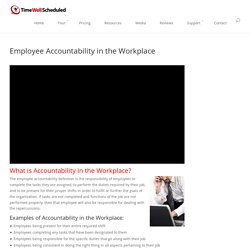

Welcome to Inc.com. Learned Optimism Test. Learned optimism. Learned optimism is the idea in positive psychology that a talent for joy, like any other, can be cultivated.
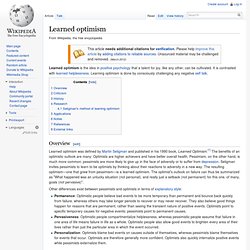
It is contrasted with learned helplessness. Learning optimism is done by consciously challenging any negative self talk. Overview[edit] Other differences exist between pessimists and optimists in terms of explanatory style: Permanence: Optimistic people believe bad events to be more temporary than permanent and bounce back quickly from failure, whereas others may take longer periods to recover or may never recover. Criticism[edit] Martin Seligman’s learned optimism now orients the armed services’ psychological stance. History[edit] Seligman came to the concept of learned optimism through a scientific study of learned helplessness, the idea that a certain reoccurring negative event is out of the person's control. Seligman shifted his focus to attempting to discover what it is that keeps some people from ever becoming helpless.
Research[edit] Applications[edit] Notes[edit] The Psychology of Attribution. In social psychology, attribution is the process of inferring the causes of events or behaviors.
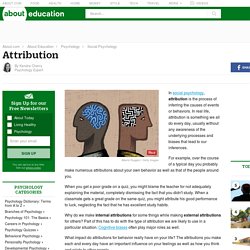
In real life, attribution is something we all do every day, usually without any awareness of the underlying processes and biases that lead to our inferences. For example, over the course of a typical day you probably make numerous attributions about your own behavior as well as that of the people around you. When you get a poor grade on a quiz, you might blame the teacher for not adequately explaining the material, completely dismissing the fact that you didn't study.
When a classmate gets a great grade on the same quiz, you might attribute his good performance to luck, neglecting the fact that he has excellent study habits. Why do we make internal attributions for some things while making external attributions for others? What impact do attributions for behavior really have on your life? Types of Attribution Theories of Attribution Heider's "Common Sense" Theory: Correspondent Inference Theory:
Getting Accountability Right. If you don’t get accountability right, you’ll have difficulty getting anything else right.
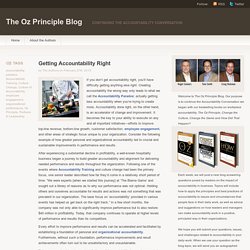
Creating accountability the wrong way only leads to what we call the Accountability Paradox: actually getting less accountability when you’re trying to create more. Accountability done right, on the other hand, is an accelerator of change and improvement. It becomes the key to your ability to execute on any and all important initiatives—efforts to improve top-line revenue, bottom-line growth, customer satisfaction, employee engagement, and other areas of strategic focus unique to your organization.
Consider the following example of how greater personal and organizational accountability led to crucial and sustainable improvements in performance and results. After experiencing a substantial decline in profitability, a well-known hospitality business began a journey to build greater accountability and alignment for delivering needed performance and results throughout the organization. Responsibility vs. Accountability. While the words responsibility and accountability are often used interchangeably, we believe there is an important, fundamental difference between the two.
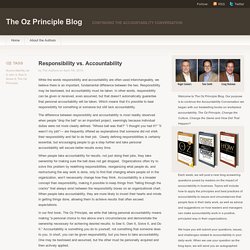
Responsibility may be bestowed, but accountability must be taken. In other words, responsibility can be given or received, even assumed, but that doesn’t automatically guarantee that personal accountability will be taken. Which means that it’s possible to bear responsibility for something or someone but still lack accountability. The difference between responsibility and accountability is most readily observed when people “drop the ball” on an important project, seemingly because individual duties were not more clearly defined. “Whose ball was that?” When people take accountability for results, not just doing their jobs, they take ownership for making sure the ball does not get dropped.
How to Build a Culture of Accountability. Accountability in the Workplace. Personal accountability in the workplace is a very important characteristic to hold.
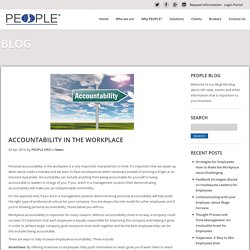
It’s important that we speak up when we’ve made a mistake and we learn to face consequences when necessary instead of pointing a finger at an innocent bystander. Developing Personal Accountability - Career Skills From MindTools.com. Taking Responsibility to Get Ahead © iStockphotoferrantraite Take responsibility and you'll reap the rewards.
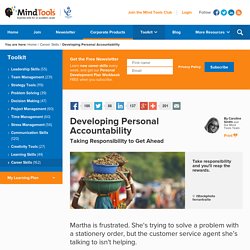
Martha is frustrated. She's trying to solve a problem with a stationery order, but the customer service agent she’s talking to isn’t helping. "It was the despatch team’s fault. "I’m sorry to hear about this problem," he says. Martha feels less stressed straight away. Pursue accountability and inspire your team to exceed its goals. Passion within the workplace – does the topic get your attention?
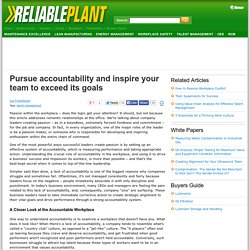
It should, but not because this article addresses romantic relationships at the office. We’re talking about company leaders creating passion – as in a boundless, extremely fervent fondness and commitment – for the job and company. In fact, in every organization, one of the major roles of the leader is be a passion maker, or someone who is responsible for developing and inspiring enthusiasm within the entire chain of command. One of the most powerful ways successful leaders create passion is by setting up an effective system of accountability, which is measuring performance and taking appropriate action.
7 Ways to Build Accountable Organizations. Employee Accountability in the Workplace. What is Accountability in the Workplace?
